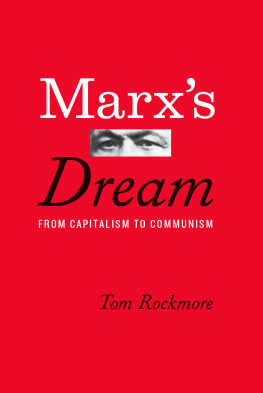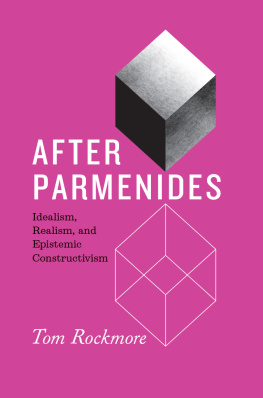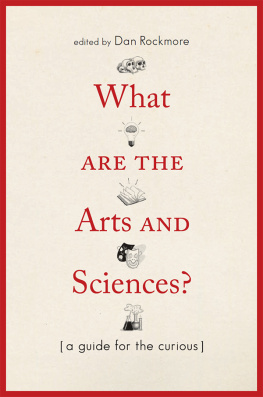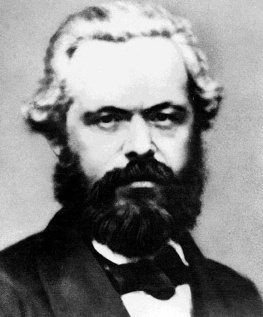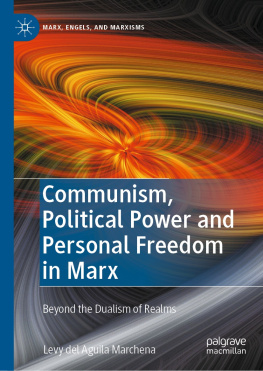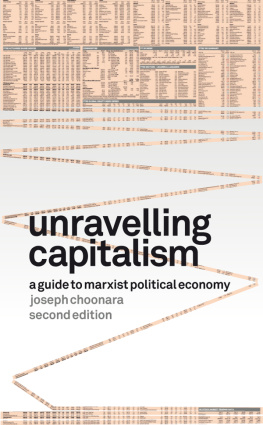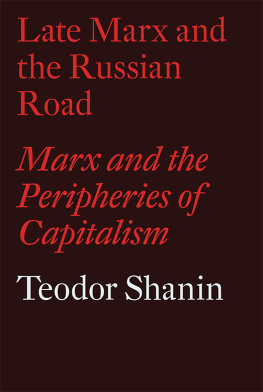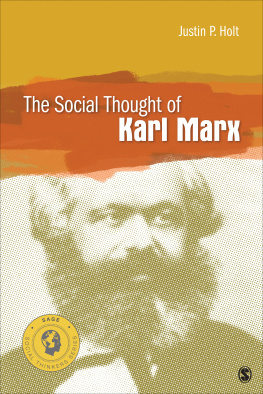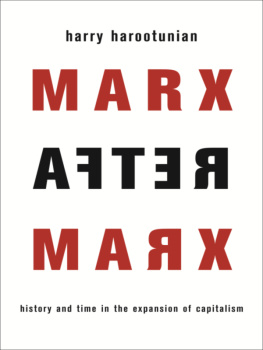Tom Rockmore - Marx’s Dream: From Capitalism to Communism
Here you can read online Tom Rockmore - Marx’s Dream: From Capitalism to Communism full text of the book (entire story) in english for free. Download pdf and epub, get meaning, cover and reviews about this ebook. year: 0, publisher: University of Chicago Press, genre: Science / Politics. Description of the work, (preface) as well as reviews are available. Best literature library LitArk.com created for fans of good reading and offers a wide selection of genres:
Romance novel
Science fiction
Adventure
Detective
Science
History
Home and family
Prose
Art
Politics
Computer
Non-fiction
Religion
Business
Children
Humor
Choose a favorite category and find really read worthwhile books. Enjoy immersion in the world of imagination, feel the emotions of the characters or learn something new for yourself, make an fascinating discovery.
- Book:Marx’s Dream: From Capitalism to Communism
- Author:
- Publisher:University of Chicago Press
- Genre:
- Year:0
- Rating:5 / 5
- Favourites:Add to favourites
- Your mark:
- 100
- 1
- 2
- 3
- 4
- 5
Marx’s Dream: From Capitalism to Communism: summary, description and annotation
We offer to read an annotation, description, summary or preface (depends on what the author of the book "Marx’s Dream: From Capitalism to Communism" wrote himself). If you haven't found the necessary information about the book — write in the comments, we will try to find it.
Marx’s Dream: From Capitalism to Communism — read online for free the complete book (whole text) full work
Below is the text of the book, divided by pages. System saving the place of the last page read, allows you to conveniently read the book "Marx’s Dream: From Capitalism to Communism" online for free, without having to search again every time where you left off. Put a bookmark, and you can go to the page where you finished reading at any time.
Font size:
Interval:
Bookmark:
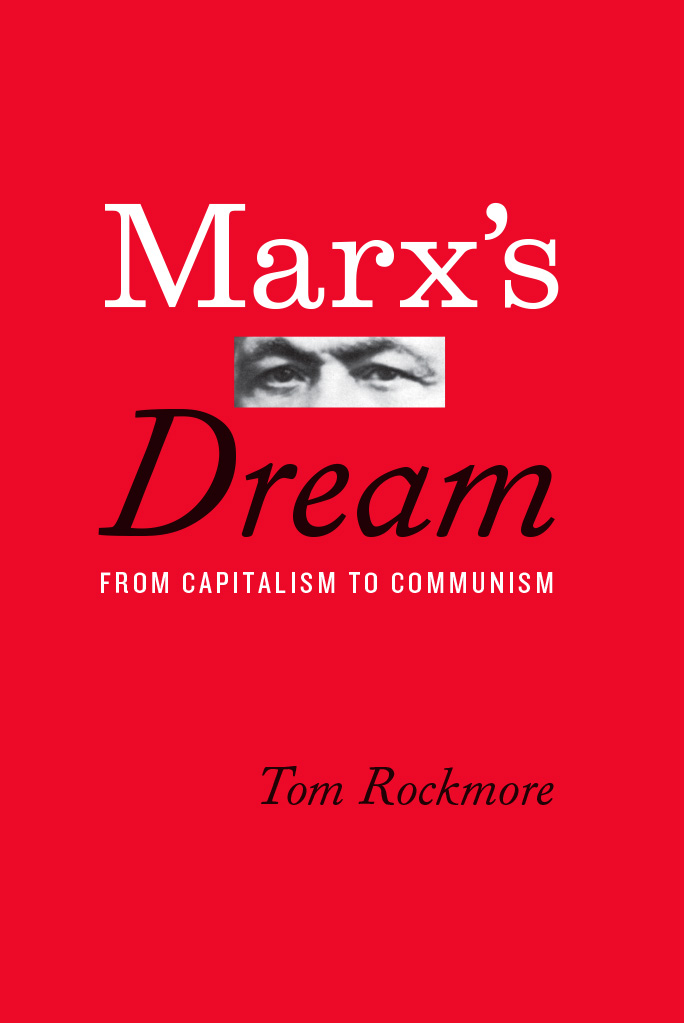
Tom Rockmore
University of Chicago Press
Chicago and London
The University of Chicago Press, Chicago 60637
The University of Chicago Press, Ltd., London
2018 by The University of Chicago
All rights reserved. No part of this book may be used or reproduced in any manner whatsoever without written permission, except in the case of brief quotations in critical articles and reviews. For more information, contact the University of Chicago Press, 1427 E. 60th St., Chicago, IL 60637.
Published 2018
Printed in the United States of America
27 26 25 24 23 22 21 20 19 18 1 2 3 4 5
ISBN-13: 978-0-226-55452-5 (cloth)
ISBN-13: 978-0-226-55466-2 (e-book)
DOI: https://doi.org/10.7208/chicago/9780226554662.001.0001
Library of Congress Cataloging-in-Publication Data
Names: Rockmore, Tom, 1942 author.
Title: Marxs dream : from capitalism to communism / Tom Rockmore.
Description: Chicago ; London : University of Chicago Press, 2018. | Includes bibliographical references and index.
Identifiers: LCCN 2017038032 | ISBN 9780226554525 (cloth : alk. paper) | ISBN 9780226554662 (e-book)
Subjects: LCSH: Marx, Karl, 18181883. | Philosophy, Modern19th century.
Classification: LCC B3305.M74 R573 2018 | DDC 335.4092dc23
LC record available at https://lccn.loc.gov/2017038032
 This paper meets the requirements of ANSI/NISO Z39.48-1992 (Permanence of Paper).
This paper meets the requirements of ANSI/NISO Z39.48-1992 (Permanence of Paper).
The unity of theory and practice exists not only in theory but also for practice.
Georg Lukcs, History and Class Consciousness
He is, by any measure, one of the most important thinkers of modern times. In the middle of the nineteenth century he dreamed a powerful dream of an alternative vision of modern industrial society. His effort to solve the ancient philosophical problem of human flourishing provides a position as well as the criterion to evaluate it in his famous claim that philosophers only interpret the world but the point is to change it. In rejecting the suggestion that philosophy as such is useful, he formulates a view that neither overlooks nor isolates theory from practice, nor substitutes practice for theory. The practical possibility of such a theory is not evident but must be examined.
One of the differences between this volume and the usual way to approach Marx is that this book attempts as much as possible to understand him through his own texts rather than seeking to understand him through Marxism. Marxism was mainly created by and still often follows Friedrich Engels. It was initially formulated in the 1880s, shortly after Marxs passing, at a time when many of Marxs central texts were not yet available. They include a number of his most important writings: A Contribution to the Critique of Hegels Philosophy of Law [Elements of the Philosophy of Right], the Paris Manuscripts, the Grundrisse, Capital volumes 2 and 3, and the Theories of Surplus Value. There are clearly political reasons for understanding Marx through Marxism in continuing to maintain the fiction that Marx and Engels hold the same view but that, as is sometimes said, Engels explains it better. Yet there are clearly philosophical reasons to understand Marx through his own writings. Since Marxism was formulated before the majority of these texts were available, there is an obvious tendency to insist on various forms of the Marxist view of Marx that has historically often been defended against the view Marx works out in writings that in many cases only later became available. In parting with this tendency, this study will base its account of Marxs position on what he in fact says as distinguished from what is often said in his name. For the present aim is not other than incidentally to find out what is living and dead in Marxism but rather to find what is living and dead in Marx.
This study breaks with the Marxist view of Marx in four main ways. First, it depicts the concern with the relation of theory to practice as arising in the tradition as early as Socrates and as constitutive of philosophy in its best moments. Second, it seeks to free Marx from his unsolicited Marxist embrace in order to consider his theory on its own merits. Third, it relies on the normal standards of philosophical debate, hence without special pleading of any kind. Fourth, it seeks to read Marx in his own context as well as from the present perspective in order to present, as far as possible, a wide-ranging, informed view of Marx for our times.
The need to read Marx not only in his own historical moment but in ours as well is obvious. This is a historical moment in which Marxs contribution lies less in his possible contribution to bringing about revolution however understood than in helping us to understand the contemporary world. Since Marx stresses practice, and since the world has changed, we should no longer read Marx in the way that, say, he was understood by Vladimir Lenin shortly after the turn of the twentieth century. It is more useful to read Marx against the background of current problems and possible solutions. Hence one aim of this volume is to suggest a different way to grasp Marx at a time when, unlike the 1920s, it no longer seems as if the entire world, or at least Europe, is teetering on the verge of revolution.
Though I will often be critical of Marx, let me say that I regard his criticisms of capitalism in the middle of the nineteenth century as correctly identifying deep, persistent problems of modern industrial society that for the most part are unfortunately still with us. The difficulty lies less in the diagnosis, which mainly appears sound, than in the suggested remedies, which are often unsound.
Marx, who died in 1883, is a rare original thinker. This study is largely concerned with piecing together, interpreting, and evaluating Marxs overall position, which he never presents in any single text. Marxs view is more than usually difficult to interpret. He is not always a precise or clear writer. Further, few of his texts, with the obvious exception of the first volume of Capital, were intended for publication or even finished. His extensive bibliography is composed of often very interesting, important, but incomplete fragments that, taken together, represent Marxs gigantic effort in a huge corpus over many years to work out his position.
Marx is often, indeed routinely, conflated with those who claim to speak in his name. Statements by influential Marxists are often taken as an authoritative description of Marxs position. In places where Marxism is historically strong, such as the Soviet Union or the Peoples Republic of China, Marx has often been and in the latter is still often studied through textbooks prepared by Marxists rather than through his own writings. This practice amounts to reducing Marxs position to a form of ideology. His success or failure in addressing the problem or problems for which his theory was formulated is less often studied.
Classical Marxism depicts Marx, under the influence of Ludwig Feuerbach, as leaving philosophy behind in order to solve the problems of classical German philosophy. This Marxist-inspired Feuerbachian approach to interpreting Marx is developed in different ways in the debate. These include the claim that Marx was concerned to leave philosophy, the idea that there is a so-called epistemological break between the early philosophical position and the later supposedly extraphilosophical scientific or at least more scientific position, the view that Marx seeks to overcome problems that German idealism is incapable of overcoming, and so on.
Next pageFont size:
Interval:
Bookmark:
Similar books «Marx’s Dream: From Capitalism to Communism»
Look at similar books to Marx’s Dream: From Capitalism to Communism. We have selected literature similar in name and meaning in the hope of providing readers with more options to find new, interesting, not yet read works.
Discussion, reviews of the book Marx’s Dream: From Capitalism to Communism and just readers' own opinions. Leave your comments, write what you think about the work, its meaning or the main characters. Specify what exactly you liked and what you didn't like, and why you think so.

